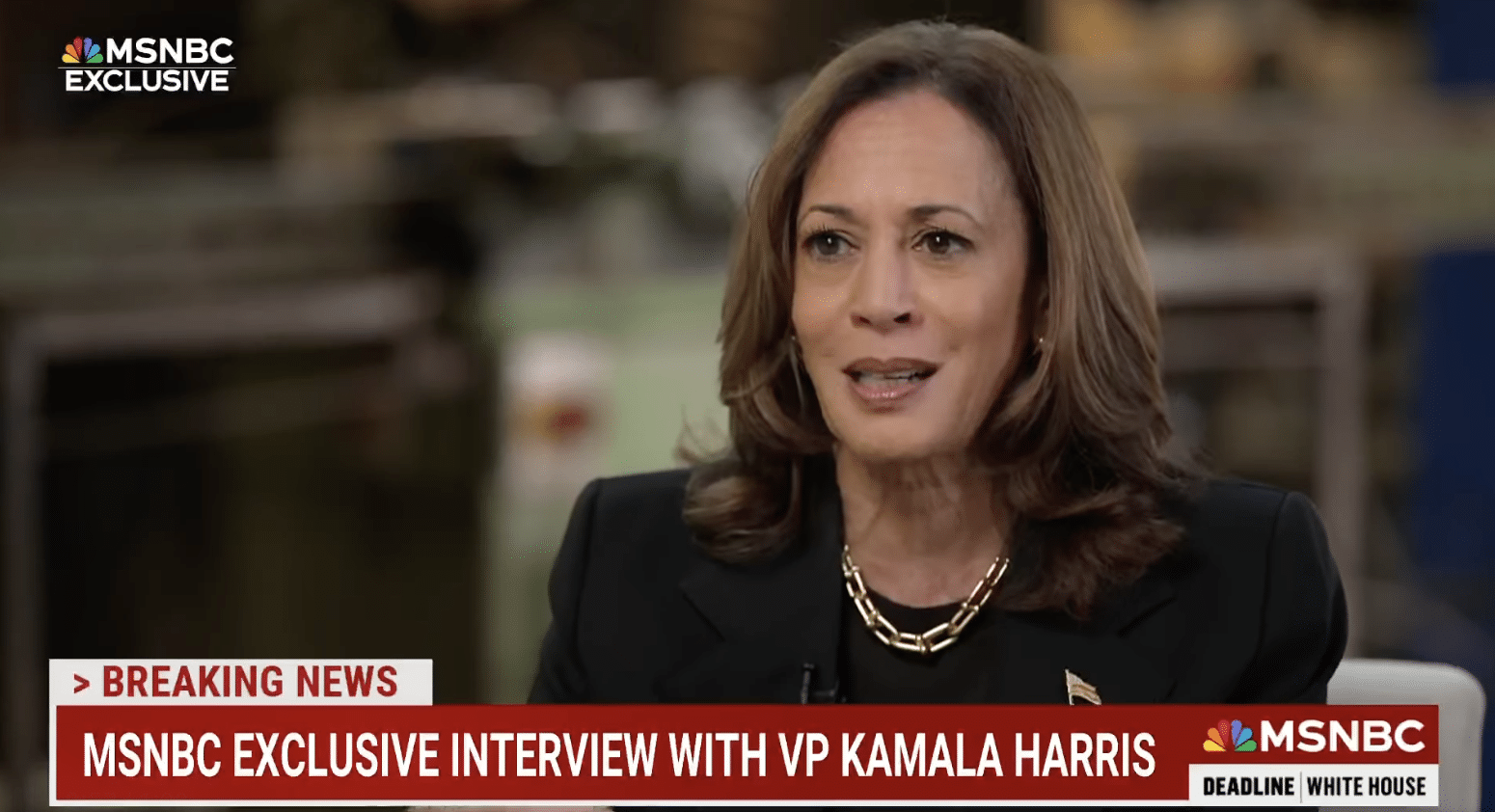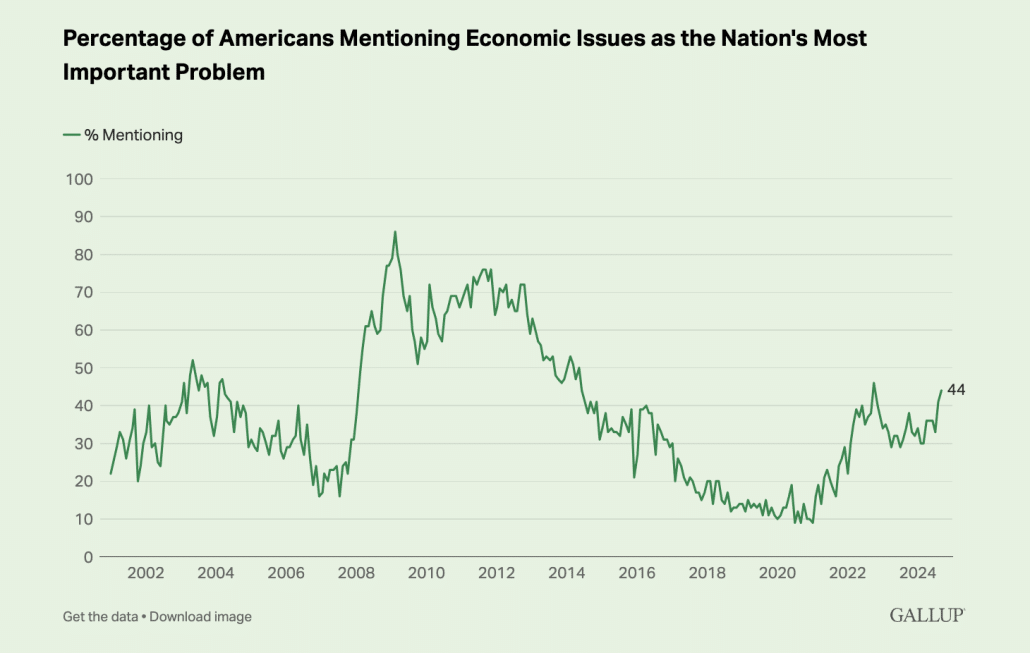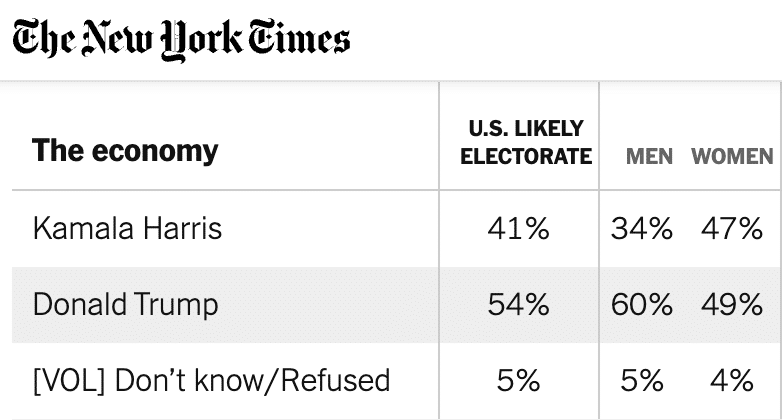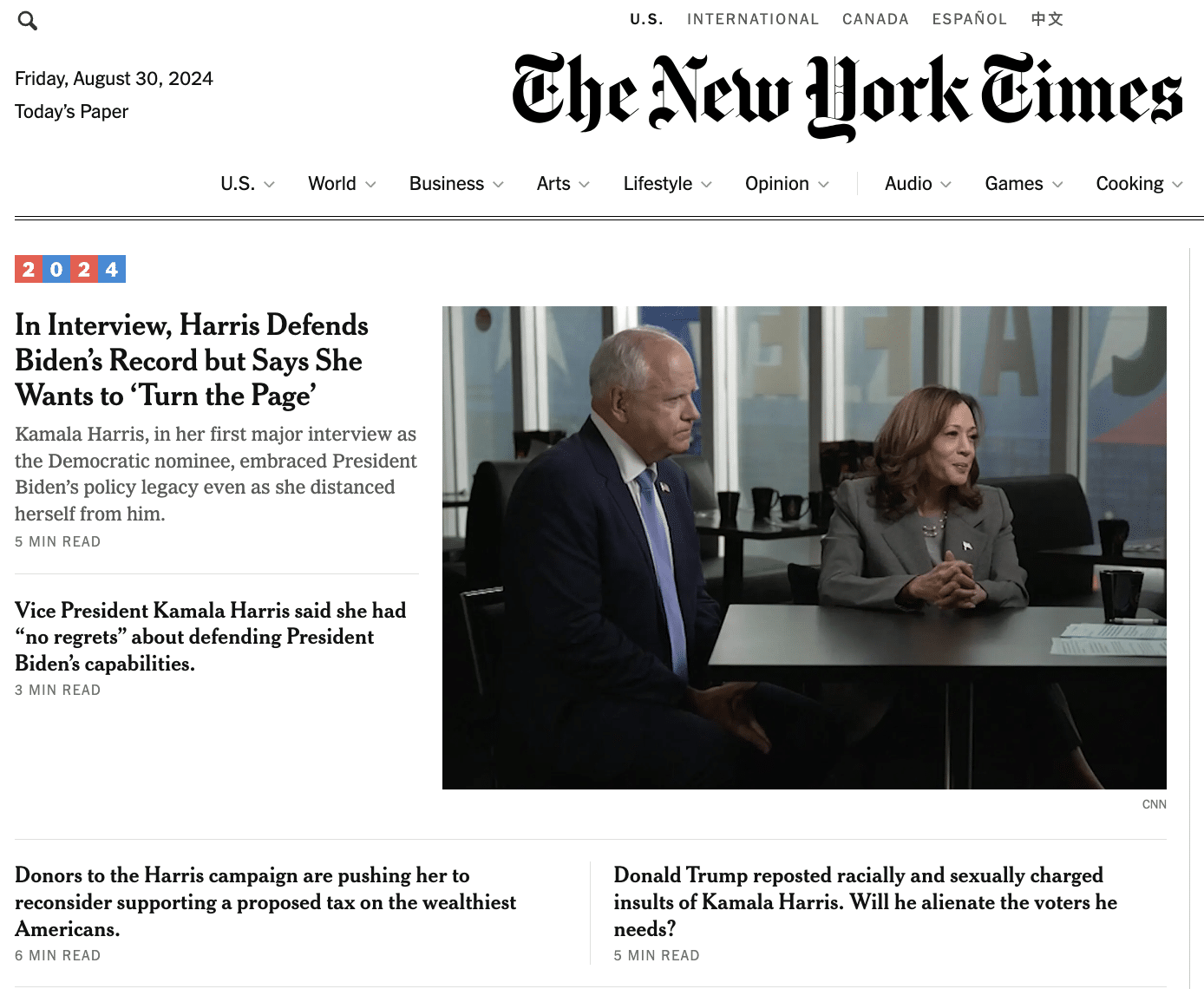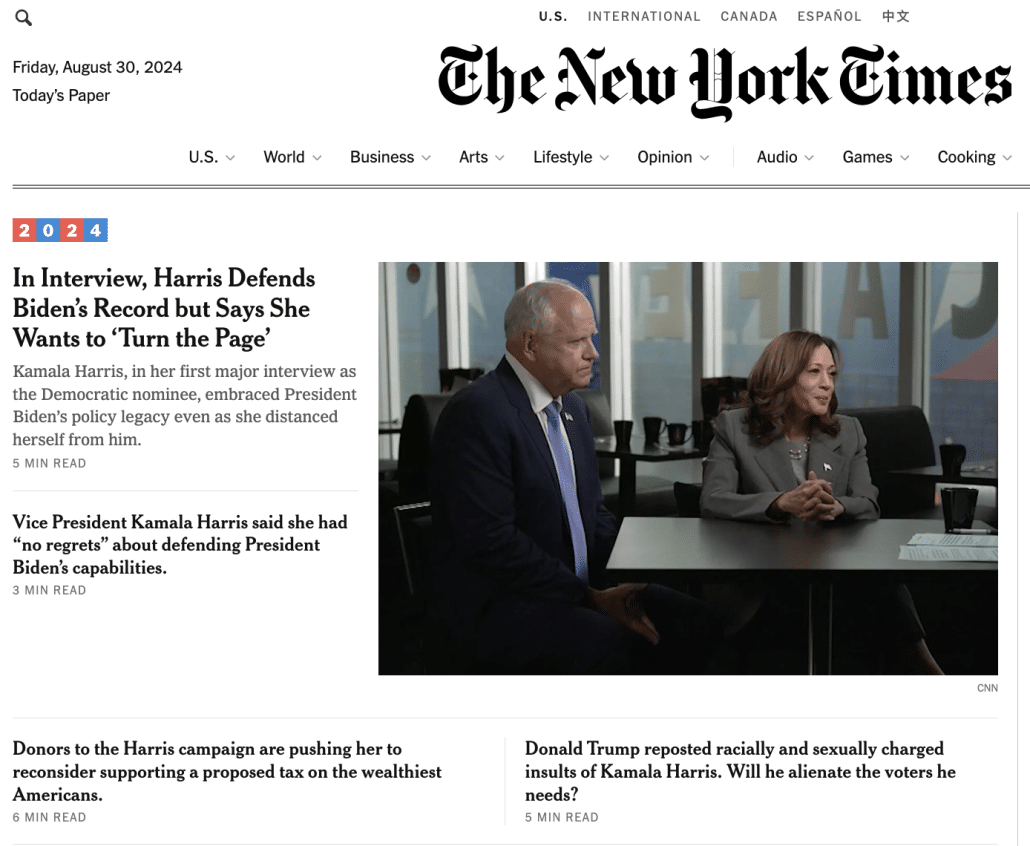Tie Game: WaPo’s Polls and Maggie’s Misinformation
According to the calendar, there is exactly a month left to the 2024 campaign.
According to math, Donald Trump has less than 5% of his campaign left (31 of 721 days).
Kamala Harris has 28% of her campaign left (31 of 107 days).
The timing is a point raised in this NBC story, which describes that, after having taken the last 76 days to introduce the Vice President to voters, the campaign now plans to ratchet up negative advertising about how unfit Trump is to be President.
Leaning more heavily into negative campaigning is a strategic shift for Harris. While she has routinely been critical of Trump since becoming a candidate in July, and before that as President Joe Biden’s running mate, much of her campaign’s focus has been on defining her and explaining her record to voters.
Harris campaign officials said they intend to continue laying out her policy positions, background and plans if she were to win the presidency — and increasing negative messaging is oftentimes a natural evolution in a presidential campaign as the candidates make their closing arguments.
But emphasizing what Harris campaign officials view as Trump’s major vulnerabilities is seen as possibly one of the only ways to finally win over some voters who haven’t made up their mind in a static race that Democrats want to push in their direction.
[snip]
Harris campaign officials noted that, with less than four months as a candidate, she had to compress what typically would have been a longer introduction of herself before moving more negative messaging to help persuade and turn out voters.
Trump has been running almost entirely negative advertising about Harris for months. She can now, finally, just 76 days into her campaign, start focusing more on how unfit he is.
That’s one of the realities of running a 107 day campaign against a guy who has campaigned for the decade after his reality TV career started to go south. The two candidates are, and have always been, running at different paces.
CNN has a pretty good wrap-up of what’s coming in the next month, broken down into the following sections:
- Where they’re spending money
- Turnout
- Campaign surrogates
- Improving economy
- Impact of Hurricane Helene on voting
- International developments
- Trump’s attempts to cheat again
- How to register
WaPo and NYT, however, are having a harder time contemplating what comes next.
WaPo’s story asks whether all the money Harris is spending will make a difference. It has six paragraphs (including the first and last) plus a nifty graphic that focus on polling showing Harris’ monetary advantage has not yet made a difference. It has seven paragraphs, plus another nifty graphic, on advertising, though doesn’t mention the strategic shift that NBC reports.
Yet it takes 22 paragraphs (of around 35) before WaPo gets around to the thing that may make the difference in a race that polls show is a statistically tied race: Turnout.
On this score, Harris’s aides believe Trump has a higher hill to climb, as the political realignment of the last decade has allowed Democrats to make inroads among more habitual voters. That is one of the reasons Democrats believe they outperformed expectations in the 2018 and 2022 midterm elections.
“Trump specifically has an electorate that requires a big campaign in some ways. Part of that is because a lot of the people they need to get are sporadic voters,” said a senior Harris strategist, who spoke on the condition of anonymity to discuss internal data. “They are definitionally harder to reach.”
Trump’s aides, for their part, argue that Harris is the one with the turnout problem.
“They better hope they have a ground game, because they’ve got hundreds of thousands of voters in every single swing state who haven’t cast a vote since the 2020 election in any election and they’re not getting a mail ballot this time,” Blair said.
The Harris campaign claimed in late September to have 330 offices and more than 2,400 staff. They completed 25,000 weekend volunteer shifts on the final weekend of last month, contacting over 1 million voters over three days and completed the 100,000th event of the campaign. Blair said the Trump campaign has more than 300 “Trump Force 47” offices for hundreds of paid staffers. The Trump campaign also claims to have 30,000 highly trained volunteer captains, in addition to other volunteers.
It takes several more paragraphs for WaPo to describe Republicans in three states expressing some concern about field, a central point of Tim Alberta’s profile of the campaign before Biden dropped out, which Hugo Lowell has been describing for weeks, and which Josh Marshal has turned to more recently.
What he has seen from the campaign, he said, is signing up some volunteers to recruit others. “I still think Trump has a slight edge here, so I don’t know if there’s a great deal of concern, but I think it is really close,” Hall said. He said the resource disparity on spending, and the ground game concerns, still give him some pause about the outcome.
There are also concerns in Michigan, three prominent Republicans said, at a lack of volunteers and organization from the Trump campaign. In Arizona, GOP Chairwoman Gina Swoboda has raised concerns privately, but she said in a statement she is now confident.
No one knows how this will turn out. But if the polls really are close to neck-and-neck (something very much in question, for a number of reasons) what will determine the election will be who gets a larger share of their seemingly same number of supporters to the polls. It’s not the polls that matter, it’s the field operation, because voting matters, not polling.
NYT’s version of the same story at least gets that part of the equation correct.
With polling averages showing all seven battleground states nearly tied, many Democrats believe their biggest advantage may be an extensive ground game operation that their party has spent more than a year building across the country.
But it parrots Trump’s claim (Maggie is on the byline) that Bibi Netanyahu’s belligerence and the aftermath of Hurricane Helene will win the race for him.
Mr. Trump’s campaign thinks that recent events — the escalating conflict in the Middle East and deadly hurricanes that have killed more than 200 people across the Southeast — will give them an edge in the final weeks.
[snip]
In contrast, Trump aides see recent events as reinforcing their central campaign message that Ms. Harris is unprepared, weak and incapable of restoring the sense of calm that the Biden administration promised when elected four years ago.
Again, Maggie is on the byline. Perhaps that’s why NYT doesn’t bother to ask — or even point out — that GOP governors throughout the affected region have had high praise for the response of the Biden-Harris team. How would a very competent, bipartisan response to a catastrophe that affected two key swing states hurt Harris, a journalist might ask?
The answer is that Trump and his flunkies have shamelessly used the disaster to spread disinformation, so much so that local conservative officials are begging national right wingers to stop making things more difficult, something CNN (among other outlets, including local ones) has covered. This should be a comment about Trump’s plan to use disinformation; it’s not.
Perhaps relatedly, in the third paragraph of this story, NYT explains why Hillary’s superior financial and turnout advantages in 2016 didn’t result in victory … without mentioning that NYT (as well as a bunch of other outlets) did the work of Russian spies by spending the last month of the campaign talking about John Podesta’s risotto recipe.
In some ways, the two approaches mirror the final days of the 2016 race, when Hillary Clinton’s campaign boasted about a massive, data-driven field organization while Mr. Trump pressed a national message based on stoking anti-immigrant sentiment and improving the economy with a relatively meager staff and almost no field operation in the key states. Mr. Trump, of course, prevailed, helped by the F.B.I. director’s reopening of an inquiry into the Democratic nominee’s emails.
It’s one thing to pretend, as Joe Kahn is, that NYT is not publishing the documents Iran stole because they’re less newsworthy than Hillary’s discussions, years before 2016 but years after 2008, of how she might run in 2016. It’s another thing to simply ignore how useful NYT was to Russian spies in 2016, to pretend that didn’t also weigh down Hillary’s campaign as she tried to defeat ongoing hacks and a flood of disinformation about stolen private emails.
Meanwhile, yet another story bylined by Reid Epstein that insists views on the economy will be determinative doesn’t mention that Trump’s lead on the issue is narrowing, and in at least one poll, has disappeared.
Republicans acknowledge they are being outspent on television and out-organized on the ground in the key states — yet they say Mr. Trump’s strength on the economy and immigration may be enough for him to overcome those structural deficits.
Surveys indicate that Republicans still hold an advantage on economic issues, even as inflation slows, gas prices drop and the Federal Reserve slashes interest rates for the first time in four years. Public opinion on immigration has also swung to the right during the Biden administration, with more Americans saying they support tougher enforcement measures to crack down on illegal immigration.
If it’s true, Reid, that whoever polls better on this wins, shouldn’t you start reporting that polling on this is narrowing?
NYT gets that field may matter. Then it serves as a vehicle for or espouses garbage claims.
Kamala Harris still has 28% of her campaign left to get voters to the polls; even as he’s falling behind on field, Trump has a fraction of that. Which may be why he’s selling the con that that a disaster relief effort that puts all of Trump’s to shame would reflect badly on Harris.
Again, there’s a lot of good reporting linked in this post. Check out CNN. Read the pieces on Republicans fighting back against Republican disinformation. Read Marshall’s assessment of whether Trump’s odd approach to field might work. Or consider the implication of the NBC piece: For some very important reasons dictated by the brevity of her campaign, Harris had to hold off on certain things that you might have seen earlier in a different campaign.


